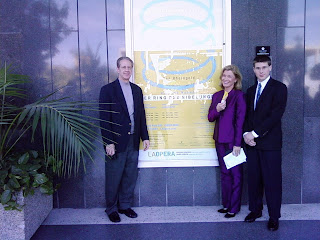
The much ballyhooed showdown between fake journalist Jon Stewart and fake investment advisor Jim Cramer only confirms what I've been saying for years about business reporting. It's useless.
The format of objective journalism reduces most business reports to some version of, "The market could go up or it could go down, we'll just have to wait and see." Viewers are presented with both possibilities as equally likely outcomes and are left to decide for themselves. Some commentators, such as Cramer, present definite points of view that are motivated by self-interest or just plain wrong. I have shown tapes of Cramer's on-air antics to students as an example of riveting talent performance. Sound investment advice? Not so much.
Critics have questioned why business journalists didn't "see it coming." As an investigative reporter who tried to expose the downside of the real estate bubble, I can tell you that inquiries were met with dismissive responses from bankers who assured us that the number of toxic mortgages was small, when compared with the number of Americans who make their payments on time. At that point, it was hard to convince my assignment editor that this was a story worth my time, as opposed to looking for cockroaches at local eateries for the "Dirty Dining" series.
So, the field of business reporting was pretty much left to the CNBC crowd, which approches financial interviews with the deferential smarm usually reserved for showbiz reporters on a movie junket, gushing over a celebrity's latest film. The writers at the Daily Show brilliantly exposed that by showing hard hitting questions from CNBC reporters like, "Is it fun to be a billionaire?" Go to the show's website to see more at: http://www.thedailyshow.com/
What is the future of business reporting? Well, it could be good or bad. We'll just have to wait and see.
The format of objective journalism reduces most business reports to some version of, "The market could go up or it could go down, we'll just have to wait and see." Viewers are presented with both possibilities as equally likely outcomes and are left to decide for themselves. Some commentators, such as Cramer, present definite points of view that are motivated by self-interest or just plain wrong. I have shown tapes of Cramer's on-air antics to students as an example of riveting talent performance. Sound investment advice? Not so much.
Critics have questioned why business journalists didn't "see it coming." As an investigative reporter who tried to expose the downside of the real estate bubble, I can tell you that inquiries were met with dismissive responses from bankers who assured us that the number of toxic mortgages was small, when compared with the number of Americans who make their payments on time. At that point, it was hard to convince my assignment editor that this was a story worth my time, as opposed to looking for cockroaches at local eateries for the "Dirty Dining" series.
So, the field of business reporting was pretty much left to the CNBC crowd, which approches financial interviews with the deferential smarm usually reserved for showbiz reporters on a movie junket, gushing over a celebrity's latest film. The writers at the Daily Show brilliantly exposed that by showing hard hitting questions from CNBC reporters like, "Is it fun to be a billionaire?" Go to the show's website to see more at: http://www.thedailyshow.com/
What is the future of business reporting? Well, it could be good or bad. We'll just have to wait and see.



